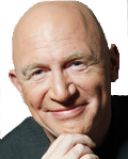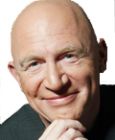
Fear
Global Economy and the Fear of Insignificance
The Global Upper Class: Do the rest of us matter?
Posted March 1, 2011
Homo Globalis is faced with a difficult predicament. A new class has evolved at the border of the upper and the upper-middle classes, which led Secretary of Labor and now professor of public policy at the University of California at Berkeley Robert Reich to speak of the "New Rich-Rich Gap." He writes:
"A new group is emerging at the very top. They're CEOs and CFOs of global corporations, and partners and executives in global investment banks, law firms and consultancies. Unlike most national symbolic analysts, these global symbolic analysts conduct almost all their work in English, and share with one another an increasingly similar cosmopolitan culture.
Most global symbolic analysts have been educated at the same elite institutions -- America's Ivy League universities, Oxford, Cambridge, the London School of Economics or the University of California, Berkeley. They work in similar environments -- in glass-and-steel office towers in the world's largest cities, in jet planes and international-meeting resorts. And they feel as comfortable in New York, London or Geneva as they do in Hong Kong, Shanghai or Sydney. When they're not working -- and they tend to work very hard -- they live comfortably, and enjoy golf and first-class hotels. Their income and wealth far surpass those of national symbolic analysts." (Robert Reich, The New Rich-Rich Gap. American Prospect, December 12, 2005.)
The impact of this new upper class is felt most strongly by the traditional upper middle class Reich calls the "national symbolic analysts." The first impact is quite concrete. Cities that house the large multinational companies' headquarters are unaffordable for a growing number of people, because real estate prices and rents shoot through the roof into stratospheric heights.
The second impact is psychological. I have, for example, worked with physicians who felt like complete idiots. "I have studied and specialized for fifteen years, and I'm starting to make money only now. I feel like a complete idiot when I look at my classmates who dropped out of medicine and moved to some biotech company or a fund that invests in them. They have more money now than I'll make in a lifetime!"
These physicians represent the larger group of the traditional professions who feel largely disenfranchised. First they feel financially stressed. They need to work very hard to just get their kids through college, and they still feel that they have difficulties maintaining the lifestyles that they were led to expect when they chose their professions.
Second, they feel that the status that they expected when they entered their professions eludes them. If doctors or lawyers could once reasonably expect to be respected in their communities, most of them, except a few stars plugged into the system of Reich's "international symbolic analysts," don't make the type of money needed to afford a lifestyle with the prestige that was associated with the traditional professions in the past.
Existential Psychology has shown the depth of the human need to matter, make a difference, to feel that you have a significant place in this world. We all need to feel that we do something that matters within the frame of reference that defines our experiential world. The question is what this frame of reference is.
Those who belong to the group of national symbolic analysts may be highly competent, and do interesting work, but their impact and reach is limited to their immediate environment. As a result they often feel left out, because the global infotainment system has become Homo Globalis' frame of reference.
Add to this that many national symbolic analysts have lost their independence through the new global developments. For lawyers it is becoming increasingly difficult to be competitive in a market that has come to be dominated by ever larger firms able to provide 24/7 services, providing their global clients with legal services at very high speed. The same holds true for consultants, accountants and advertisers whose environment has changed dramatically with the advent of global firms like McKinsey, Ernst and Young and McCann Erickson.
Our culture, addicted to global success stories, is making it increasingly difficult for the overwhelming majority of people who make a decent living through hard work, but do not belong to the global ruling class, to feel that they matter. In future posts I will address the question how we can regain our sense of self-worth in the new global economy.
This post is adapted from Carlo Strenger, The Fear of Insignificance: Searching for Meaning in the Twenty-first Century



